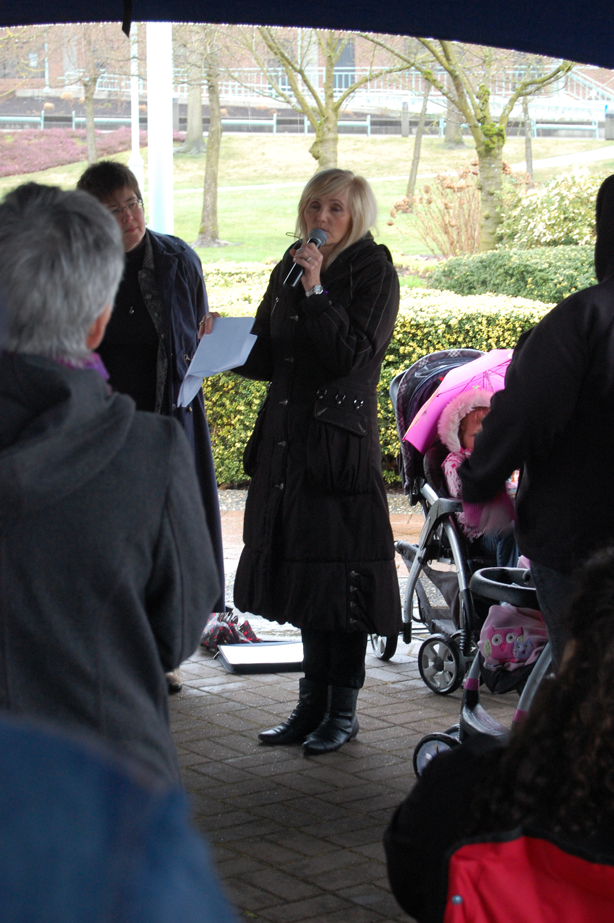By Nadine Moedt (The Cascade) – Email
Print Edition: March 12, 2014

International Women’s Day (IWD) was observed internationally on March 8.
Spirits were not dampened by the sluicing rain in Abbotsford, where the day was marked with song, dance, and various speakers outside the Reach gallery.
While IWD is a celebration of the gains in gender equality and women’s rights, speakers at the “One Billion Rising” event reminded their audience that these advances must be guarded.
“As we celebrate this day, we are also painfully aware that the gains women have made are not secure and that the assault on gender equality in Canada has been broad and sweeping under Harper’s Conservative government,” one speaker said.
Support services like Abbotsford Transition House, which supplies the basic necessities, food, crisis counselling, and housing to women in need, have undergone major funding cuts.
Abbotsford councillor Patricia Ross later shared her story. As a girl she was abducted and raped over a period of four hours before she managed to escape.
“I was raised in a generation when we were told we just have to get over these traumatic events,” Ross said. It took her 20 years to see a therapist.
“The memories actually develop like a muscle around your heart and mind … It will relax from time to time, but a word, a picture, hearing about another similar circumstance can trigger a memory, and the muscle will tighten its grip on you again and bring you right back to the moment it happened.”
Ross said she later found the judgements and insensitivity of others took just as heavy a toll on her mental health.
“I actually needed as much therapy to get over the effects from so-called friends and the cruel things people would say,” she said, “as I did the actual experience itself.” Her counsellor at the time explained to her that this is a common thing in rape victims.
“All the questions and judgements were about me,” Ross says. “Why should I be put in the position of having to justify my actions, my wardrobe, or what I did that night? Where were the questions for him — I didn’t hear them. Why was he there, out trolling for victims?”
The problem is not individual cruelty, but a societal insensitivity, Ross explained.
Her court case following the incident confirmed this in her mind.
“My rapist made me feel like I was nothing, like I was an expendable and a throwaway. The court system confirms that because you are only considered a witness.”
Ross spoke about the importance of restorative justice, which puts the offender together with the victim for an apology. The victim is offered counselling, as well as both the families, and the offender has to do whatever satisfies the victim for restitution. The victim is given the respect that is required for healing.
Her rapist received a mere six months in prison.
Ross found her faith in humanity shaken to the core.
However, events like the Women’s day rally help rebuild her confidence.
“Events like this where people want to help people they don’t even know restores my faith.”
Ross closed her speech with a favourite quote from the Dalai Lama: “If you want others to be happy, practice compassion. If you want to be happy, practice compassion.”
Supportiveness and compassion is healing.
“That,” she said, “is how we will change the world.”
As the day progressed, the rally moved indoors, where women’s rights activist Rumana Monzur spoke about her experiences.
Monzur, a UBC student, was brutally attacked by her husband, who would not accept her returning to school to complete her education. She was left blinded and beaten, but survived. She now studies law, having completed a master’s degree in political science.
UFV student Nicole Haney attended the event in part to help raise awareness of the violence committed against First Nations women, and for the 800 missing and murdered First Nations women.
“It’s a huge issue, so I thought it very important to attend,” says Haney, who is of Aboriginal descent. While raising awareness is crucial, the event also celebrated women.
“It was an opportunity to share their experience as women. Not only the struggles, but to promote feeling proud of being a woman,” Haney says. “There is too much shame … women need to stand up and be proud of what we are and need to unite as women, as human beings.”
Haney was particularly moved by Monzur’s speech.
“It was so amazing to see such a strong woman speak out and able to pursue her goals,” she says.
“Despite everything that she went through, growing up in a culture that [oppresses] women, here she is, highly educated, speaking on behalf of woman’s rights; it was incredible.”
